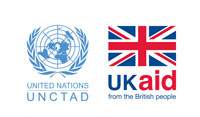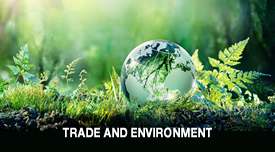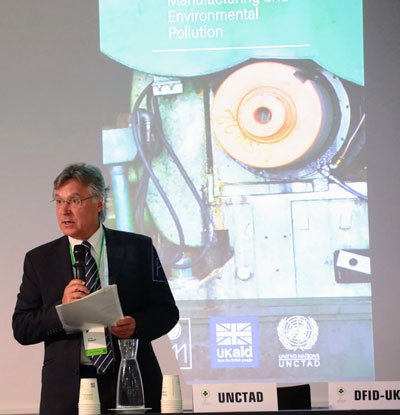 Support for a turnkey joint UNCTAD and United Kingdom development aid sustainable manufacturing and environmental pollution programme grows. Manufacturing pollution is an international challenge, but for developing countries it’s often a trade-off between what’s green and what stimulates growth. Such trade-offs are not always necessary, and research can demonstrate how to bridge the gap between economy and environment.
Support for a turnkey joint UNCTAD and United Kingdom development aid sustainable manufacturing and environmental pollution programme grows. Manufacturing pollution is an international challenge, but for developing countries it’s often a trade-off between what’s green and what stimulates growth. Such trade-offs are not always necessary, and research can demonstrate how to bridge the gap between economy and environment.
This is the goal of a £24.6 million ($31.2 million) research initiative supported United Kingdom Department for International Development (UK-DFID) which is making waves in the circular economy sector. The Sustainable Manufacturing and Environmental Pollution (SMEP) research programme was launched by UK-DFID and UNCTAD in 2018 and is a five-year project. It was introduced at a side session of the World Circular Economy Forum 2019 in Helsinki on 4 June where ideas and actions focused on identifying and reducing manufacturing pollution in Sub-Saharan Africa (SSA) and South Asia were presented. The programme will fund research to assess the state of play of low-tech manufacturing in the regions with a view to developing high-impact technological solutions that minimize environmental impact.
Alessandro Moscuzza of UK-DFID emphasized the importance of producing high-quality research on manufacturing pollution in developing countries. He said this not only advances the frontier of scientific knowledge in this area, but also facilitates technology absorption that help developing countries develop industrial capacity in a more sustainable manner. He cautioned though that for research to produce policy impact, it was important to work with national governments and the private sector. The first step is the research. UNCTAD recently entered inked a deal the Stockholm Environment Institute for a baseline study to map pollution hotspots in various manufacturing sectors in African and Asian countries.
UNCTAD’s trade and environment head, Lucas Assunção, said the study would focus on the food packaging, plastics, rubber, leather and textiles sectors, all significant contributors to pollution. “These industries will benefit from analysis which can help them make decisions about how they manufacture in the future,” said Mr. Assunção.
Positive reinforcement
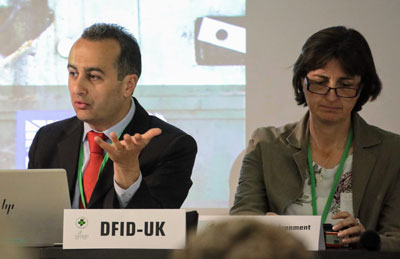 The SMEP programme was well received, with attendees heralding it as a positive and necessary initiative in both SSA and South Asia. At the side event, UNCTAD, UK-DFID, the SEI, Ellen MacArthur Foundation (EMF), United Nations University (UNU-WIDER), World Business Council on Sustainable Development (WBCSD) and Blue Skies Holdings discussed ways to maximize the impact of the programme.
The SMEP programme was well received, with attendees heralding it as a positive and necessary initiative in both SSA and South Asia. At the side event, UNCTAD, UK-DFID, the SEI, Ellen MacArthur Foundation (EMF), United Nations University (UNU-WIDER), World Business Council on Sustainable Development (WBCSD) and Blue Skies Holdings discussed ways to maximize the impact of the programme.
The lead researcher from SEI, Prof. Lisa Emberson, emphasized the need for a detailed assessment of pollution connected to manufacturing in the countries and sectors of interest.
UNCTAD’s Robert Hamwey described how the programme plans to achieve a high impact through country-driven technical assistance activities. These activities include engaging national stakeholders including policymakers, the private sector and civil society, and focussing on sectors of national priority. Stakeholder consultations will begin in late 2020.
Make the circle bigger
A discussion panel then brought sectoral views to the issue of manufacturing pollution in developing countries, from stakeholders with different types of sectorial expertise.
Hugh Pile from BlueSkies Holdings offered the practical perspective of a multinational company. BlueSkies is a £100 million company producing fruit-based products in Africa and Latin America and exporting to European markets. He emphasized the importance of programmes like SMEP to help companies find viable solutions to production-related environmental challenges. The challenges include ways of minimizing the use plastic (packaging) and water, especially for food processing companies that are exposed to stringent controls from inspectors in export markets.
Prof. Tony Addison of UNU-WIDER, stressed the importance of reinterpreting industrialization in SSA and South Asia through the lens of circularity and green manufacturing, which may be sources of comparative advantage for local enterprises aiming to enter foreign markets.
Joss Bleriot from the Ellen MacArthur Foundation mentioned the importance of keeping circularity at the core of efforts to improve manufacturing, based on potentials recently estimated through the work of the foundation in developing countries like India and China. He added concrete initiative such as SMEP could serve as platforms to develop multi-stakeholder partnerships involving “green giants” and developing country governments, with the ultimate effect of helping create (greener) industrial ecosystems.
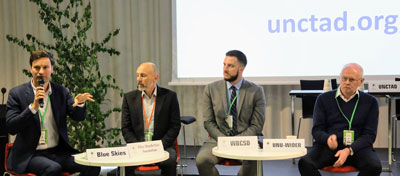 Brendan Edgerton from WBCSD, which is a key advisor to the Alliance to End Plastic Waste, mentioned their members see the reduction of environmental pollution, including plastics pollution, as a top priority. Public-private investment is also needed to scale up green business models and develop key infrastructure, he said. The discussions served as part of a multi-stage process to gather inputs to guide the preparation of upcoming research calls in 2020. Several participants also made constructive comments on the roll out of SMEP.
Brendan Edgerton from WBCSD, which is a key advisor to the Alliance to End Plastic Waste, mentioned their members see the reduction of environmental pollution, including plastics pollution, as a top priority. Public-private investment is also needed to scale up green business models and develop key infrastructure, he said. The discussions served as part of a multi-stage process to gather inputs to guide the preparation of upcoming research calls in 2020. Several participants also made constructive comments on the roll out of SMEP.
Dr. Willibrod Peter Slaa, the Tanzanian Ambassador to Sweden, emphasized that the involvement of national stakeholders will help ensure real results at the country level. He further stressed that the programme needs to change perceptions on pollution among the population, including through educational outreach.
Malena Sell of the Finnish Ministry of Foreign Affairs noted that developing country manufacturers need to keep up with circular economy product developments, requirements and standards in order not to maintain access to major markets in Europe and that SMEP should assist beneficiary countries in this regard.
Photo credits: Henrique Pacini
